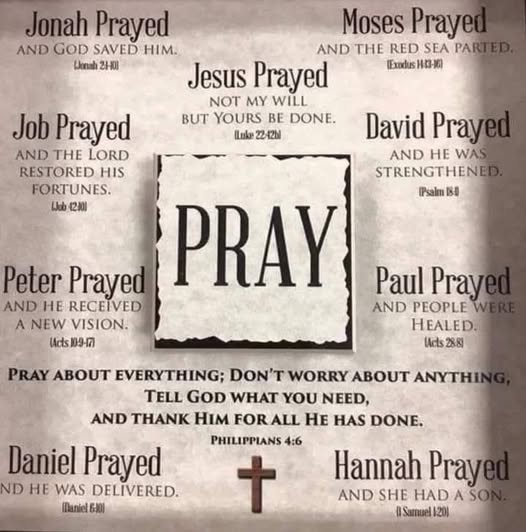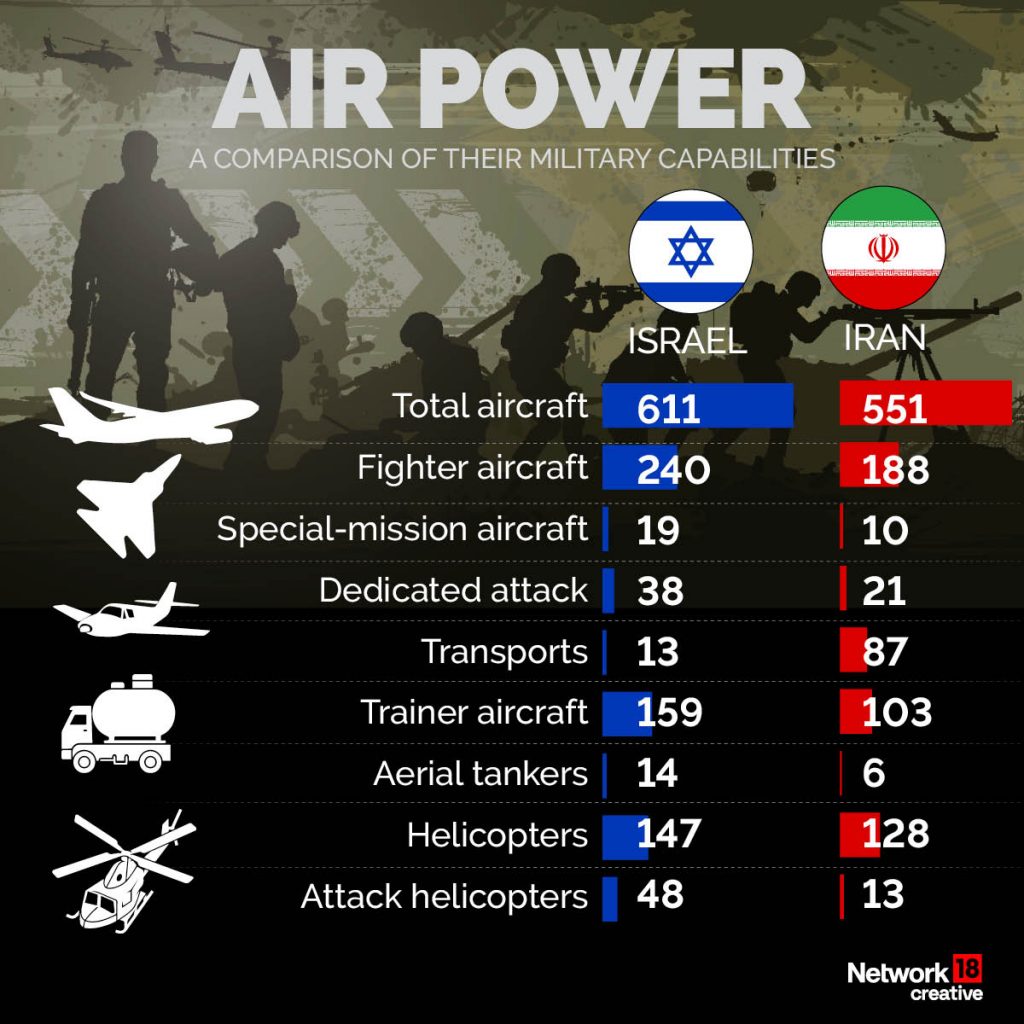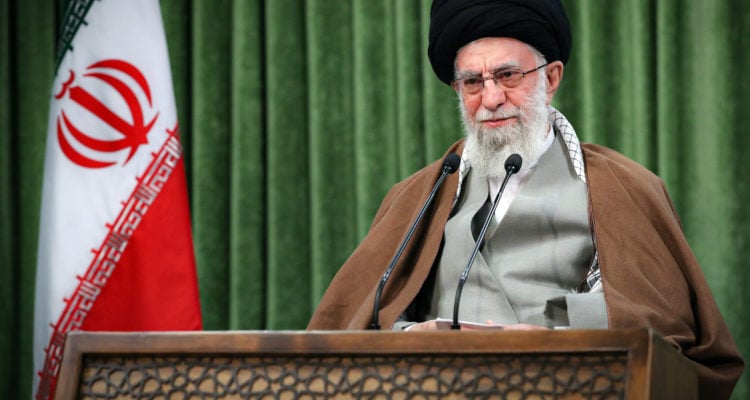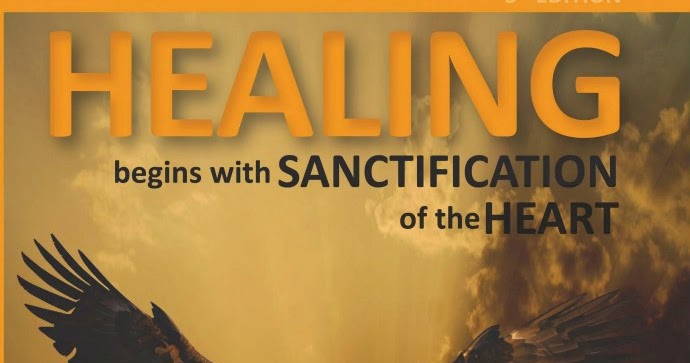Hosted by TruLight Ministries – The Place of Truth

The Bible reveals many types of prayers and employs a variety of words to describe the practice. For example, 1 Timothy 2:1 says, “First of all, then, I urge that supplications, prayers, intercessions, and thanksgivings be made for all people.” Here, all four of the main Greek words used for prayer are mentioned in one verse.
Here are the main types of prayers in the Bible:
The prayer of faith: James 5:15 says, “And the prayer of faith will save the one who is sick, and the Lord will raise him up.” In this context, prayer is offered in faith for someone who is sick, asking God to heal. When we pray, we are to believe in the power and goodness of God (Mark 9:23).
The prayer of agreement (also known as corporate prayer): After Jesus’ ascension, the disciples “all joined together constantly in prayer” (Acts 1:14). Later, after Pentecost, the early church “devoted themselves” to prayer (Acts 2:42). Their example encourages us to pray with others.
The prayer of request (or supplication): We are to take our requests to God. Philippians 4:6 teaches, “Do not be anxious about anything, but in everything by prayer and supplication with thanksgiving let your requests be made known to God.” Part of winning the spiritual battle is to be “praying at all times in the Spirit, with all prayer and supplication” (Ephesians 6:18).
The prayer of thanksgiving: We see another type of prayer in Philippians 4:6: thanksgiving or thanks to God. “With thanksgiving let your requests be made known to God.” Many examples of thanksgiving prayers can be found in the Psalms.
The prayer of worship: The prayer of worship is similar to the prayer of thanksgiving. The difference is that worship focuses on who God is; thanksgiving focuses on what God has done. Church leaders in Antioch prayed in this manner with fasting: “While they were worshiping the Lord and fasting, the Holy Spirit said, ‘Set apart for me Barnabas and Saul for the work to which I have called them.’ Then after fasting and praying they laid their hands on them and sent them off” (Acts 13:2-3).
The prayer of consecration: Sometimes, prayer is a time of setting ourselves apart to follow God’s will. Jesus made such a prayer the night before His crucifixion: “And going a little farther he fell on his face and prayed, saying, ‘My Father, if it be possible, let this cup pass from me; nevertheless, not as I will, but as you will’” (Matthew 26:39).
The prayer of imprecation: Imprecatory prayers are found in the Psalms (e.g., 7, 55, 69). They are used to invoke God’s judgment on the wicked and thereby avenge the righteous. The psalmists use this type of appeal to emphasize the holiness of God and the surety of His judgment. Jesus teaches us to pray for blessing on our enemies, not cursing (Matthew 5:44-48).
The Bible also speaks of praying in the Spirit (1 Corinthians 14:14-15) and prayers when we are unable to think of adequate words (Romans 8:26-27). In those times, the Spirit Himself makes intercession for us.
Prayer is conversation with God and should be made without ceasing (1 Thessalonians 5:16-18). As we grow in our love for Jesus Christ, we will naturally desire to talk to Him.
Die Bybel openbaar baie soorte gebede en gebruik ‘n verskeidenheid woorde om die praktyk te beskryf. Byvoorbeeld, 1 Timoteus 2:1 sê: “Alles wat ek dan versoek, is dat smekinge, gebede, voorbiddings en danksegginge gedoen moet word vir alle mense.” Hier word al vier die hoof Griekse woorde wat vir gebed gebruik word, in een vers genoem.
Hier is die hooftipes gebede in die Bybel:
Die gebed van geloof: Jakobus 5:15 sê: “En die gebed van geloof sal die sieke red, en die Here sal hom oprig.” In hierdie konteks word gebed in geloof geoffer vir iemand wat siek is, en God gevra om te genees. Wanneer ons bid, moet ons in die krag en goedheid van God glo (Markus 9:23).
Die gebed van ooreenstemming (ook bekend as gesamentlike gebed): Na Jesus se hemelvaart het die dissipels “almal saamgewerk in gebed” (Handelinge 1:14). Later, na Pinkster, het die vroeë kerk “hulself gewy” aan gebed (Handelinge 2:42). Hul voorbeeld moedig ons aan om saam met ander te bid.
Die gebed van versoek (of smeking): Ons moet ons versoeke na God bring. Filippense 4:6 leer: “Moet oor niks besorg wees nie, maar laat julle begeertes in alles deur gebed en smeking met danksegging bekend word by God.” Deel van die wen van die geestelike stryd is om “altyd in die Gees te bid met alle gebed en smeking” (Efesiërs 6:18).
Die gebed van danksegging: Ons sien ‘n ander tipe gebed in Filippense 4:6: danksegging of danksegging aan God. “Laat julle begeertes met danksegging bekend word by God.” Baie voorbeelde van dankseggingsgebede kan in die Psalms gevind word.
Die gebed van aanbidding: Die gebed van aanbidding is soortgelyk aan die gebed van danksegging. Die verskil is dat aanbidding fokus op wie God is; danksegging fokus op wat God gedoen het. Kerkleiers in Antiochië het op hierdie manier met vas gebid: “Terwyl hulle die Here aanbid en vas, het die Heilige Gees gesê: ‘Sonder Barnabas en Saulus vir My af vir die werk waartoe Ek hulle geroep het.’ Nadat hulle gevas en gebid het, het hulle hulle die hande opgelê en hulle weggestuur” (Handelinge 13:2-3).
Die gebed van toewyding: Soms is gebed ‘n tyd om onsself af te sonder om God se wil te volg. Jesus het so ‘n gebed die nag voor Sy kruisiging gedoen: “En Hy het ‘n bietjie verder gegaan en op sy aangesig geval en gebid en gesê: ‘My Vader, as dit moontlik is, laat hierdie beker by My verbygaan; nogtans nie soos Ek wil nie, maar soos U wil’” (Matteus 26:39).
Die gebed van vervloeking: Vervloekende gebede word in die Psalms gevind (bv. 7, 55, 69). Hulle word gebruik om God se oordeel oor die goddeloses af te roep en sodoende die regverdiges te wreek. Die psalmis gebruik hierdie tipe appèl om die heiligheid van God en die sekerheid van Sy oordeel te beklemtoon. Jesus leer ons om te bid vir seën oor ons vyande, nie vervloeking nie (Matteus 5:44-48).
Die Bybel praat ook van gebed in die Gees (1 Korintiërs 14:14-15) en gebede wanneer ons nie aan geskikte woorde kan dink nie (Romeine 8:26-27). In daardie tye tree die Gees self vir ons in.
Gebed is ‘n gesprek met God en moet sonder ophou gedoen word (1 Tessalonisense 5:16-18). Soos ons groei in ons liefde vir Jesus Christus, sal ons natuurlik verlang om met Hom te praat.
Bible Verse and Prayer for Today;

Wait on the LORD: be of good courage, and he shall strengthen thine heart: wait, I say, on the LORD.
Psalm 27:14
Prayer
Lord . Please Help us to Wait on You Lord . Help us to Have Full Faith in You and then we will receive Your Good Courage and our Hearts will receive the Strenght to Undure anything this world can bring . Help us to WAIT on You Lord , we Pray in Jesus name . Amen and Amen
Bybel Vers en Gebed vir Vandag
Wag op die HERE, hou goeie moed, en Hy sal jou hart sterk maak; wag, sê ek, op die HERE.
Psalm 27:14
Gebed
Here. Help ons asseblief om op U te wag, Here. Help ons om volle geloof in U te hê, en dan sal ons u goeie moed ontvang en ons harte sal die krag ontvang om enigiets wat hierdie wêreld kan bring, te verduur. Help ons om op U te WAG, Here, ons bid in Jesus se Naam. Amen en Amen.

Bible Teaching of the Day
TruLight Ministries are a Tentmaking Ministry . what does it mean ?
Tentmaking is a metaphorical term used to refer to holding a career in order to allow oneself the opportunity to engage in Christian ministry. Tentmakers are Christian workers, usually missionaries, who work full-time to support themselves rather than draw support or a salary from a church or mission organization. Tentmaking is so-called because the apostle Paul was a tentmaker by trade and relied on that trade to support himself in Corinth on his second missionary journey. Paul met Priscilla and Aquila, and, “because he was a tentmaker as they were, he stayed and worked with them. Every Sabbath he reasoned in the synagogue, trying to persuade Jews and Greeks” (Acts 18:3–4).
Although Paul worked full-time planting churches and preaching the gospel, he made it a point to support himself whenever possible, and he did so by his chosen trade of tentmaking. He later told the elders in Ephesus, “I have not coveted anyone’s silver or gold or clothing. You yourselves know that these hands of mine have supplied my own needs and the needs of my companions” (Acts 20:33–34). Using outside employment to supply one’s own needs in the ministry is what tentmaking is all about.
Some Christians are called by God into ministries or areas of the world where they cannot be financially supported by the spiritual work they do, so they find employment in addition to their ministry. Start-up churches are often pastored by a person who also works a full-time job. Some missionaries move into regions where they find employment while hosting Bible studies in the evenings; in some “closed” countries, tentmaking is the only option for a missionary. These are examples of Christian tentmaking.
Sometimes a person called into ministry prefers tentmaking to the more traditional method of seeking outside support. Tentmakers choose to provide their own financial support as a means of staying connected with the people to whom they minister. They believe that maintaining full-time secular employment helps them better identify with others and ensures they are not a financial burden to those they serve. Also, the struggles of the business world give them opportunities to live out their message and model lifestyle evangelism. First Corinthians 9:14 makes it clear that those who teach the gospel have the right to make their living from the gospel, but it’s a right that some choose to lay aside. Tentmaking is a worthy method of obeying Jesus’ command to “make disciples of every nation” (Matthew 28:19).
Bybel Lering vir die Dag
TruLight Ministries is ‘n Tentmakerbediening. Wat beteken dit?
Tentmakery is ‘n metaforiese term wat gebruik word om te verwys na ‘n loopbaan om jouself die geleentheid te gee om aan Christelike bediening deel te neem. Tentmakers is Christelike werkers, gewoonlik sendelinge, wat voltyds werk om hulself te onderhou eerder as om ondersteuning of ‘n salaris van ‘n kerk of sendingorganisasie te trek. Tentmakery word so genoem omdat die apostel Paulus ‘n tentmaker van beroep was en op daardie ambag staatgemaak het om homself in Korinte te onderhou op sy tweede sendingreis. Paulus het Priscilla en Aquila ontmoet, en, “omdat hy ‘n tentmaker was soos hulle, het hy gebly en by hulle gewerk. Elke Sabbat het hy in die sinagoge geredeneer en Jode en Grieke probeer oortuig” (Handelinge 18:3-4).
Alhoewel Paulus voltyds gewerk het om kerke te plant en die evangelie te verkondig, het hy dit ‘n punt gemaak om homself te onderhou waar moontlik, en hy het dit gedoen deur sy gekose ambag van tentmakery. Hy het later vir die ouderlinge in Efese gesê: “Ek het niemand se silwer of goud of klere begeer nie. Julle weet self dat hierdie hande van my in my eie behoeftes en die behoeftes van my metgeselle voorsien het” (Handelinge 20:33–34). Om buitewerk te gebruik om in jou eie behoeftes in die bediening te voorsien, is waaroor tentmaak gaan.
Sommige Christene word deur God geroep tot bedieninge of gebiede van die wêreld waar hulle nie finansieel ondersteun kan word deur die geestelike werk wat hulle doen nie, daarom vind hulle werk benewens hul bediening. Beginkerke word dikwels gelei deur ‘n persoon wat ook ‘n voltydse werk doen. Sommige sendelinge trek na streke waar hulle werk vind terwyl hulle Bybelstudies in die aande aanbied; in sommige “geslote” lande is tentmaak die enigste opsie vir ‘n sendeling. Dit is voorbeelde van Christelike tentmaak.
Soms verkies ‘n persoon wat tot die bediening geroep word, tentmaak bo die meer tradisionele metode om buiteondersteuning te soek. Tentmakers kies om hul eie finansiële ondersteuning te verskaf as ‘n manier om in verbinding te bly met die mense aan wie hulle bedien. Hulle glo dat die behoud van voltydse sekulêre werk hulle help om beter met ander te identifiseer en verseker dat hulle nie ‘n finansiële las is vir diegene wat hulle dien nie. Boonop gee die stryd van die sakewêreld hulle geleenthede om hul boodskap uit te leef en lewenstylevangelisasie te modelleer. 1 Korintiërs 9:14 maak dit duidelik dat diegene wat die evangelie verkondig, die reg het om hul bestaan uit die evangelie te maak, maar dit is ‘n reg wat sommige kies om opsy te sit. Tentmaak is ‘n waardige metode om Jesus se opdrag te gehoorsaam om “dissipels van elke nasie te maak” (Matteus 28:19).

Today’s Devotional
In Colossians 1:24 Paul writes, “Now I rejoice in what I am suffering for you, and I fill up in my flesh what is still lacking in regard to Christ’s afflictions, for the sake of his body, which is the church.” We know that Christ’s death was the fully sufficient payment for our sin, so what did Paul mean when he said that something in Christ’s afflictions was “still lacking”?
Paul is not saying that there was anything lacking or deficient in the sufferings that Christ endured to atone for the sins of the world. Rather, Paul is saying that his (Paul’s) suffering for Christ’s sake was still lacking. Although he had suffered much affliction, Paul was not yet conformed to the Savior in his sufferings. Other translations of Colossians 1:24 bring out Paul’s meaning more clearly: “I am glad when I suffer for you in my body, for I am participating in the sufferings of Christ that continue for his body, the church” (NLT); and “Now I rejoice in my sufferings on your behalf. And with my own body I supplement whatever is lacking [on our part] of Christ’s afflictions, on behalf of His body, which is the church” (AMP). Note that the lack is on Paul’s part, not Christ’s.
Paul also speaks of his sufferings in relation to those of Christ in 2 Corinthians 1:5: “For just as we share abundantly in the sufferings of Christ, so also our comfort abounds through Christ.” Paul’s sufferings on behalf of the church were not without purpose. They enabled him to comfort other believers going through difficulties. This is also part of what Paul means in Colossians 1:24 when he refers to this suffering taking place “for the sake of the body,” meaning the Body of Christ, the body of believers.
The apostle Paul certainly endured many sufferings for Christ during his ministry. He encountered beatings, imprisonment, stoning, and much more (2 Corinthians 11:23–28). The deeper his troubles, the more deeply Paul saw a connection with the Lord who had suffered so much for him. In Galatians 6:17 he writes, “I bear on my body the marks of Jesus.” Paul’s afflictions were no surprise to him. When Paul was commissioned for his task, the Lord Jesus said, “I will show him how much he must suffer for my name” (Acts 9:16).
Jesus taught that in this world we would have trouble (John 16:33). “If the world hates you, keep in mind that it hated me first” (John 15:18). Paul and Barnabas, on the first missionary journey, certainly saw the truth of Jesus’ words as they revisited the cities where they had planted churches, “strengthening the disciples and encouraging them to remain true to the faith. ‘We must go through many hardships to enter the kingdom of God,’ they said” (Acts 14:22). Paul’s teaching that Christians should expect suffering and that his own suffering filled up what was “lacking” is diffused throughout his work. But the theme of joyfulness in suffering is also present. That’s why Paul could say, “I rejoice in what I am suffering for you” (Colossians 1:24; cf. Philippians 2:17).
In summary, Paul was not suffering to merit grace or earn his salvation; neither was he complementing or completing the sufferings that Jesus personally experienced. Rather, Paul saw his suffering as helping conform him into the image of Christ. We, too, can view our trials and afflictions as a means to make us more like Jesus, as we are “predestined to be conformed to the image of his Son” (Romans 8:29). Until we join Christ in glory, we will experience some of the same suffering that Jesus Christ did as part of God’s sanctifying process.
Vandag se Bemoediging
In Kolossense 1:24 skryf Paulus: “Nou verbly ek my in die lyding wat ek vir julle ly, en ek vul in my vlees aan wat nog ontbreek aan Christus se lyding, ter wille van sy liggaam, wat die kerk is.” Ons weet dat Christus se dood die ten volle voldoende betaling vir ons sonde was, so wat het Paulus bedoel toe hy gesê het dat iets in Christus se lyding “nog ontbreek”?
Paulus sê nie dat daar enigiets ontbreek of tekort skiet in die lyding wat Christus verduur het om die sondes van die wêreld te versoen nie. Paulus sê eerder dat sy (Paulus se) lyding ter wille van Christus nog ontbreek het. Alhoewel hy baie lyding gely het, was Paulus nog nie in sy lyding aan die Verlosser gelykvormig nie. Ander vertalings van Kolossense 1:24 bring Paulus se betekenis duideliker uit: “Ek is bly wanneer ek in my liggaam vir julle ly, want ek deel aan die lyding van Christus wat voortduur vir sy liggaam, die kerk” (NLT); en “Nou verbly ek my in my lyding vir julle. En ek vul met my eie liggaam aan wat [aan ons kant] aan Christus se lyding kortkom, namens sy liggaam, wat die kerk is” (AMP). Let daarop dat die tekort aan Paulus se kant is, nie Christus s’n nie.
Paulus praat ook van sy lyding in verhouding tot dié van Christus in 2 Korintiërs 1:5: “Want net soos ons oorvloedig deel het aan die lyding van Christus, so is ons troos ook oorvloedig deur Christus.” Paulus se lyding namens die kerk was nie sonder doel nie. Dit het hom in staat gestel om ander gelowiges wat deur moeilike tye gegaan het, te vertroos. Dit is ook deel van wat Paulus in Kolossense 1:24 bedoel wanneer hy verwys na hierdie lyding wat plaasvind “ter wille van die liggaam”, wat die Liggaam van Christus, die liggaam van gelowiges, beteken.
Die apostel Paulus het beslis baie lyding vir Christus verduur tydens sy bediening. Hy het slae, gevangenskap, steniging en nog baie meer teëgekom (2 Korintiërs 11:23–28). Hoe dieper sy probleme, hoe dieper het Paulus ‘n verbintenis met die Here gesien wat soveel vir hom gely het. In Galasiërs 6:17 skryf hy: “Ek dra die littekens van Jesus in my liggaam.” Paulus se lyding was geen verrassing vir hom nie. Toe Paulus vir sy taak aangestel is, het die Here Jesus gesê: “Ek sal hom toon hoeveel hy vir my Naam moet ly” (Handelinge 9:16).
Jesus het geleer dat ons in hierdie wêreld probleme sou hê (Johannes 16:33). “As die wêreld julle haat, onthou dat dit My eerste gehaat het” (Johannes 15:18). Paulus en Barnabas het op die eerste sendingreis beslis die waarheid van Jesus se woorde gesien toe hulle die stede waar hulle kerke gestig het, herbesoek het, “en die dissipels versterk en hulle aangemoedig het om getrou te bly aan die geloof. Hulle het gesê: ‘Ons moet deur baie ontberinge gaan om in die koninkryk van God in te gaan'” (Handelinge 14:22). Paulus se lering dat Christene lyding moet verwag en dat sy eie lyding aanvul wat “ontbreek” het, word deur sy werk versprei. Maar die tema van vreugde in lyding is ook teenwoordig. Daarom kon Paulus sê: “Ek verbly my in wat ek vir julle ly” (Kolossense 1:24; vgl. Filippense 2:17).
Kortom, Paulus het nie gely om genade te verdien of sy verlossing te verdien nie; hy het ook nie die lyding wat Jesus persoonlik ervaar het, aangevul of voltooi nie. Paulus het eerder sy lyding gesien as iets wat hom gehelp het om na die beeld van Christus te verander. Ons kan ook ons beproewinge en lyding beskou as ‘n manier om ons meer soos Jesus te maak, aangesien ons “voorbestem is om na die beeld van sy Seun gelykvormig te wees” (Romeine 8:29). Totdat ons by Christus in heerlikheid aansluit, sal ons van dieselfde lyding ervaar wat Jesus Christus as deel van God se heiligmakingsproses gedoen het.

TruLight Ministries Daily Entertainment
TruLight TV – Kids Hour – Godly Character
Mike and Chef Elaine teach Claire about godly character on Apple Pie Day at Konnect HQ. And Later we meet Nicolai, a 13-year-old from Norway, who is learning to help his family herd reindeer. In this episode we learn that even when life seems scary, God is good! This and some stunning kids’ songs. Enjoy!
INTRODUCTION TO THE GOSPEL ARTISTS
MEET : Riley Clemmons

Riley Clemmons is an artist who has accumulated over half a billion global streams and over 105 million YouTube video views. After spending years refining her craft in writers’ rooms, Riley sky-rocketed onto the scene with her 2017 Capitol CMG debut single “Broken Prayers,” which has generated over 60 million global streams since its release. Her 2018 self-titled album debut quickly entered the Billboard Heatseekers chart, debuting at No. 13. Riley added to her accomplishments with her well known single “Fighting For Me” being RIAA Gold Certified this year.
Riley’s music has cemented her place as an artist to watch with accolades from Rolling Stone, People Magazine, Dove Awards Nomination, KLOVE Award Nomination as well as performances on the TODAY Show, FOX & Friends, and debut at the Grand Ole Opry. A Nashville native who is an accomplished composer, performer, producer, and recording artist, Riley draws inspiration from life experiences, blending musical influences to create music that is as catchy as it is relatable.
Today on TruLight Radio XM

TruLight Radio XM 24/7
Program
GMT / UTC +2
00:15 Words to Live By Testimonies
01.15 Science Scripture and Salvation
02.15 Ground Works
04.00 Gospel Concert of the Day
05.00 The Daren Streblow Comedy Show
5:55 It is Today devotional
6:00 Gaither Homecoming Morning Show
7:15 Discover the Word
8.15 Destined for Victory
8:55 Science Scripture and Salvation
9:00 Holy Spirit Hour – Normally Sermons
10:15 Hope of the Heart
11:15 Unshackled
11.45 Words to Live By
12:15 Truth for Life
13:15 Living on the Edge with Chip Ingram
14:15 Focus on the Family
15:00 Kids Hour
16:00 In Touch with Dr. Charles Stanley
16:30 Groundwork
17:15 Live in the Light
18:15 Renewing your Mind
19:00 Gaither Homecoming Show
20:15 Growing Hope
21:15 Adventures in Odyssey Radio Drama
21:45 Bible Reading
22:15 Night-sounds
23.00 Good Old Country Gospel / Rhema Gospel Express
VISIT THE WEBSITE
https://TruLightRadioXM.org.za

Bible Prophecy in the News
US evacuating embassy staff, families from Israel

Some American embassy and staff and families of diplomats are being evacuated from Israel, as fears of broader conflict grow.
The United States Embassy in Israel has started evacuating non-essential staff and diplomats’ families from Israel, an official confirmed to the Associated Press.
The evacuation comes as the conflict between Israel and Iran ramps up, with speculation that the U.S. will soon join the fighting.
Since the outbreak of the war on June 13th, Iran has launched heavy ballistic missile barrages on the Jewish State, which have killed 24 people and wounded at least 500.
Israel’s airspace has been closed since last Friday, leaving tens of thousands of Israelis stranded outside the country’s borders.
While tourists, diplomats, and Israeli citizens can leave Israel by using its land borders with Egypt and Jordan, numerous countries, including the U.S., have hinted at arranging rescue flights, which would see Israel’s airspace temporarily reponed for repatriation purposes.
“Urgent notice! American citizens wanting to leave Israel- US Embassy in Israel … is working on evacuation flights & cruise ship departures,” U.S. Ambassador to Israel Mike Huckabee wrote in an X post on Wednesday.
“You must enroll in the Smart Traveler Enrollment Program (STEP). You will be alerted w/ updates,” Huckabee added.
However, the U.S. State Department said in a statement following Huckabee’s tweet that it had “no announcement about assisting private U.S. citizens to depart at this time.”
On Monday, the U.S. State Department on Monday elevated its travel advisory for Israel to a Level 4 “do not travel,” its most severe warning.
Japan, China and Indonesia said on Thursday morning that they are gearing up to help repatriate their citizens who are currently in Israel and Iran.
The Chinese Embassy said it was organizing buses to transport its citizens to the Taba border crossing with Egypt, near the Red Sea port city of Eilat.

Khamenei from Iran : ‘We will not be merciful toward the Zionists’

U.S. President Donald Trump posted on social media on Tuesday that Washington knows “exactly where the so-called ‘Supreme Leader’ is hiding,” but that he was safe for the time being.
Iran’s Supreme Leader Ali Khamenei on Wednesday urged forceful action against the Jewish state, even as the Israeli Air Force continued to operate freely over the skies of Tehran and decimate the city’s military hierarchy.
“We must act forcefully against the Zionist terrorist entity. We will not be merciful toward the Zionists,” Khamenei wrote in a Hebrew-language post on X.
Last week, immediately after Israel launched “Operation Rising Lion” to roll back Iran’s nuclear program, Khamenei tweeted in Hebrew: “This grave mistake will make the Zionist entity miserable and turn its life into misery.”
U.S. President Donald Trump posted on social media on Tuesday that Washington knows “exactly where the so-called ‘Supreme Leader’ is hiding,” but that he was safe for the time being.
“He is an easy target, but he is safe there—we are not going to take him out (kill!) at least for now,” Trump wrote on Truth Social. “But we don’t want missiles shot at civilians or American soldiers. Our patience is wearing thin. Thank you for your attention to this matter!”
Israeli Prime Minister Benjamin Netanyahu told ABC News on Monday night that eliminating Khamenei would not escalate but rather end the conflict between Tehran and Jerusalem.
Pressed on the issue, the prime minister told ABC that Jerusalem was “doing what we need to do” to address the threat posed by Tehran.
What Happens When The U.S. Enters the Iran-Israel War?

While headlines will rage with talk of missiles and militia threats, the most serious consequences will unfold more quietly, deeply, and dangerously over time. Below are four outcomes every American should grasp – because once the U.S. steps into this conflict, the ripple effects will reach all of us.
The Quiet Forces Tearing Iran From Within – Iran’s Digital & Financial Collapse

While the world’s headlines are fixated on missile launches and airstrikes lighting up Middle Eastern skies, a quieter — yet arguably more consequential — war is raging beneath the surface. It’s a war not fought with jets or rockets, but with firewalls, financial chaos, psychological tactics, and the tightening grip of authoritarian control.
Signs of the Times
| Last night, Prime Minister Netanyahu said something historic: “Cyrus freed the Jews, and today the Jewish state might free the Persians.” And in a divine twist of history, Israel is striking deep into Tehran on the exact Hebrew date the downfall of ancient Persia began in the Book of Esther. Regardless of whether President Trump decides for the USA to join in our military offensive against the Islamic republic of Iran, we will win even on our own. Am Yisrael Chai!!! |
No Limits: Britain Legalises Abortion Up To The Moment Of Birth

In a move that has stunned many across the UK and beyond, British lawmakers have voted to decriminalize abortion up until birth in England and Wales. It means that a healthy baby, viable and capable of surviving outside the womb, can now legally be aborted for any reason–including social or economic circumstances–right up to the moment of birth.
Gog and Magog Update
The United States is preparing to send its most advanced aircraft carrier, the USS Gerald R. Ford, to the Mediterranean Sea, marking the latest in a series of major military movements amid escalating tensions between Israel and Iran, according to the NY Post.

According to a report by CNN’s senior national security correspondent Zachary Cohen, the $13 billion nuclear-powered carrier is expected to depart for Europe as soon as next week.
The move, while reportedly part of a deployment schedule planned last year, is widely seen as a significant show of force during a volatile period in the Middle East.
Once in the Mediterranean, the Ford will become the third US aircraft carrier operating near Iran, joining the USS Carl Vinson, currently stationed in the Persian Gulf, and the USS Nimitz, which the US Navy redirected from Southeast Asia earlier this week.
Iran may switch to cruise missiles instead or even Nuclear of dwindling supply of ballistics

In the first days of the war, Iran launched 100 to 150 missiles at Israel per day, mostly at Jewish civilian centers.
But on the fourth day of the war, these numbers began to dramatically drop off, from 50 to 30, and yesterday, less than 20.
Over the past 14 months, Iran has launched approximately 700 medium-range ballistic missiles at Israel, depleting its arsenal and making it more selective in targeting and timing to preserve remaining stockpiles.
Iran is now launching smaller salvos of missiles at Israel, primarily because its missile stockpile has been significantly depleted after months of conflict and recent intense Israeli airstrikes targeting its launchers and missile infrastructure.
Experts estimate Iran has a remaining inventory of only 300 to 1,300 missiles, and possibly fewer, as Israeli operations continue to destroy launchers and storage sites.
This reduction in available missiles forces Iran to be more selective and conservative in its use, opting for smaller, more targeted barrages rather than the large-scale salvos seen earlier in the conflict.
Military commentator for Israel’s Channel 14, Hillel Biton Rosen, says now that Iran is back against the wall, it has gone from acting like a nation at war to a terror group.
Some experts believe Iran will now try for a long war of attrition by continuing to shoot small amounts of missiles at Israel for a long period. This would be just enough to disrupt daily life without causing huge damage.
Others believe that Iran will now pivot to using cruise missiles to maintain pressure on Israel and compensate for its dwindling supply of ballistic missiles.
Iran has already used cruise missiles against Israel in the current conflict, and it is highly likely that Iran will continue or even increase their use as the war progresses.
Cruise missiles are attractive to Iran because, unlike ballistic missiles, they fly at low altitudes, can maneuver to avoid air defenses, and are harder to detect and intercept.
While cruise missiles are slower than ballistic missiles and take longer to reach their targets, their ability to evade Israeli missile defense systems makes them a valuable part of Iran’s arsenal.
HEALING ARTICLES AND PRAYER

TruLight Ministries offer a Wide Range of EYE OPENING Healing Articles and various Illnesses . Cancers and other Chronic Illness :
TruLight Ministries bied ‘n wye reeks OOGOPENENDE Genesingsartikels en verskeie siektes. Kankers en ander chroniese siektes:
“”” If 87% of diseases are a result of what goes on in our thought life, then
87% of diseases can be cured by sorting out our thought life. “””
Dr Michelle Strydom MD – Healing begins with Sanctification of the Heart – 19 Video Teachings . One Video per Day

Dr Michelle Strydom trained and qualified as a medical doctor in South Africa and her desire is to practice medicine for the glory of God and leave behind a legacy of His love. She authored Healing Begins with Sanctifcation of the Heart and uncovers the foundation of disease by providing insight, from both a medical and Biblical perspective, into the spiritual, psychological and physical mechanisms that produce ill health. Her teaching demonstrates how latest medical research confirms Biblical principles of health and disease and reveals how coming back in line with His Word through repentance and sanctification helps us to overcome illness, be healed and made whole.
Teaching EPISODE 17 – WHO YOU ARE IN CHRIST
TruLight Ministry News

TruLight Ministries orders from God since 2012 . Teach Them , Comfort Them and Warn Them!
////////////
TruLight Ministries opdrag vanaf God sedert 2012. Leer hulle, Troos hulle en Waarsku hulle!
BATTLE CANCER (INTRODUCTION VIDEO)
TruLight School of Theology have started with Its daily Bible Study – Pastor Counselling Certificate – we are Starting with 36 Studies with 10 Studies per Topic from 1st of April 2025 – Over the Next 2 Years we will Include One Daily Study per Topic on this Platform. The Daily Manna Bible Study will be Available in English and Afrikaans!
We will Start with a 68 week Study on “Know Your Bible” Daily Bible Summaries of every Chapter in the Bible! From the Old Testament to the New Testament , from Genesis to Revelation 66 Books of the Bible.
Started 1st April 2025
This is our Study Principals:
SOAP
Scripture: Read a short passage out loud.
Observation: What do you notice about the verses?.
Application: How can you apply this to your life?.
Prayer: Pray about what you’ve learned.
REAP
Read: Read the passage carefully.
Engage: Ask questions about the passage.
Apply: Think about how the passage applies to your life.
Pray: Pray about what you’ve learned.
Introduction to the Bible – Bible Summary
Summary of the Book of
Revelation
Author: Revelation 1:1,4,9 and 22:8 specifically identify the author of the Book of
Revelation as the apostle John.
Date of Writing: The Book of Revelation was likely written between A.D. 90 and 95.
Purpose of Writing: The Revelation of Jesus Christ was given to John by God “to show
his servants what must soon take place.” This book is filled with mysteries about things
to come. It is the final warning that the world will surely end and judgment will be
certain. It gives us a tiny glimpse of heaven and all of the glories awaiting those who
keep their robes white. Revelation takes us through the great tribulation with all its woes
and the final fire that all unbelievers will face for eternity. The book reiterates the fall of
Satan and the doom he and his angels are bound for. We are shown the duties of all
creatures and angels of heaven and the promises of the saints that will live forever with
Jesus in the New Jerusalem. Like John, we find it hard to describe what we read in the
book of Revelation.
Key Verses:
Revelation 1:19, “Write, therefore, what you have seen, what is now and what will take
place later.”
Revelation 13:16-17, “He also forced everyone, small and great, rich and poor, free and
slave, to receive a mark on his right hand or on his forehead, so that no one could buy
or sell unless he had the mark, which is the name of the beast or the number of his
name.”
Revelation 19:11, “I saw heaven standing open and there before me was a white horse,
whose rider is called Faithful and True. With justice he judges and makes war.”
Revelation 20:11, “Then I saw a great white throne and him who was seated on it. Earth
and sky fled from his presence, and there was no place for them.”
Revelation 21:1, “Then I saw a new heaven and a new earth, for the first heaven and the
first earth had passed away, and there was no longer any sea.”
Brief Summary: The Revelation is lavish in colorful descriptions of the visions which
proclaim for us the last days before Christ’s return and the ushering in of the new
heaven and new earth. The Revelation begins with letters to the seven churches of Asia
Minor, then goes on to reveal the series of devastations poured out upon the earth; the
mark of the beast, “666”; the climactic battle of Armageddon; the binding of Satan; the
reign of the Lord; the Great White Throne Judgment; and the nature of the eternal city
of God. Prophecies concerning Jesus Christ are fulfilled and a concluding call to His
Lordship assures us that He will soon return.
Connections: The Book of Revelation is the culmination of the prophecies about
the end times, beginning with the Old Testament. The description of the antichrist
mentioned in Daniel 9:27 is developed fully in chapter 13 of Revelation. Outside of
Revelation, examples of apocalyptic literature in the Bible are Daniel chapters 7-12,
Isaiah chapters 24-27, Ezekiel chapters 37-41, and Zechariah chapters 9-14. All these
prophecies come together in the Book of Revelation.
Practical Application: Have you accepted Christ as your Savior? If so, you have nothing
to fear from God’s judgment of the world as described in the Book of Revelation. The
Judge is on our side. Before the final judgment begins, we must witness to friends and
neighbors about God’s offer of eternal life in Christ. The events in this book are real. We
must live our lives in a way that demonstrates the truth of what we know so that others
will notice our joy about our future and want to join us in that new and glorious city.
Inleiding tot die Bybel – Bybel Samevatting
Opsomming van die Boek
Openbaring
Outeur: Openbaring 1:1 , 4 , 9 en 22:8 identifiseer spesifiek die skrywer van die Boek
Openbaring as die apostel Johannes.
Datum van Skrywe: Die Boek Openbaring is waarskynlik tussen 90 en 95 nC geskryf.
Doel van Skrywe: Die Openbaring van Jesus Christus is deur God aan Johannes gegee
“om sy diensknegte te wys wat binnekort moet plaasvind”. Hierdie boek is gevul met
raaisels oor dinge wat kom. Dit is die laaste waarskuwing dat die wêreld sekerlik sal
eindig en oordeel seker sal wees. Dit gee ons ‘n klein blik op die hemel en al die
heerlikhede wat wag op diegene wat hul klere wit hou. Openbaring neem ons deur die
groot verdrukking met al sy ellende en die finale vuur wat alle ongelowiges vir ewig sal
trotseer. Die boek herhaal die val van Satan en die ondergang waarvoor hy en sy engele
op pad is. Ons word gewys op die pligte van alle skepsels en engele van die hemel en
die beloftes van die heiliges wat vir ewig saam met Jesus in die Nuwe Jerusalem sal
lewe. Soos Johannes vind ons dit moeilik om te beskryf wat ons in die boek Openbaring
lees.
Sleutelverse:
Openbaring 1:19 , “Skryf dan op wat jy gesien het, wat nou is en wat later sal gebeur.”
Openbaring 13:16-17 “Hy het ook almal gedwing, klein en groot, ryk en arm, vry en
slaaf, om ‘n merk op sy regterhand of op sy voorhoof te ontvang, sodat niemand kon
koop of verkoop as hy nie die merk, dit is die naam van die dier of die getal van sy
naam.”
Openbaring 19:11 , “Ek het die hemel oop sien staan en daar was ‘n wit perd voor my,
wie se ruiter Getrou en Waaragtig genoem word. Met geregtigheid oordeel en voer hy
oorlog.”
Openbaring 20:11 , “Toe sien ek ‘n groot wit troon en Hom wat daarop sit. Die aarde en
die hemel het van sy aangesig weggevlug, en daar was geen plek vir hulle nie.”
Openbaring 21:1 “Toe het ek ‘n nuwe hemel en ‘n nuwe aarde gesien, want die eerste
hemel en die eerste aarde het verbygegaan, en daar was geen see meer nie.”
Kort opsomming: Die Openbaring is oorvloedig in kleurvolle beskrywings van die
visioene wat die laaste dae voor Christus se wederkoms en die inlui van die nuwe hemel
en nuwe aarde vir ons verkondig. Die Openbaring begin met briewe aan die sewe kerke
van Klein-Asië, en gaan dan voort om die reeks verwoestings te openbaar wat oor die
aarde uitgestort is; die merk van die dier, “666”; die klimaksslag van Armageddon; die
binding van Satan; die heerskappy van die Here; die Groot Wit Troon Oordeel; en die
aard van die ewige stad van God. Profesieë aangaande Jesus Christus word vervul en ‘n
slotoproep tot Sy Heerskappy verseker ons dat Hy binnekort sal terugkeer.
Verbindings: Die Boek Openbaring is die hoogtepunt van die profesieë oor die eindtyd
, wat begin met die Ou Testament. Die beskrywing van die antichris wat in Daniël 9:27
genoem word , word volledig in hoofstuk 13 van Openbaring ontwikkel. Buiten
Openbaring is voorbeelde van apokaliptiese literatuur in die Bybel Daniël hoofstukke 7-
12, Jesaja hoofstukke 24-27, Esegiël hoofstukke 37-41, en Sagaria hoofstukke 9-14. Al
hierdie profesieë kom saam in die Boek Openbaring.
Praktiese toepassing: Het jy Christus as jou Verlosser aangeneem? Indien wel, het jy
niks om te vrees vir God se oordeel oor die wêreld soos beskryf in die Boek Openbaring
nie. Die Regter is aan ons kant. Voordat die finale oordeel begin, moet ons aan vriende
en bure getuig oor God se aanbod van die ewige lewe in Christus. Die gebeure in
hierdie boek is werklik. Ons moet ons lewens leef op ‘n manier wat die waarheid
demonstreer van wat ons weet, sodat ander ons vreugde oor ons toekoms sal raaksien
en by ons wil aansluit in daardie nuwe en glorieryke stad.
Lering deur Pastoor Dirk / Teaching by Pastor Dirk

Lering deur Pastoor Dirk
Leringe deur ons in Huis Bybelleraar, Pastoor Dirk. Pastoor Dirk is ‘n Onderwyser in Bybelprofesie en ‘n groot verskeidenheid ander Bybelonderwerpe soos, Genesing, Heilige Geesdoop, Eindtyd en Algemene Bybelkennis Hy staan bekend as die Kwaai Internet Pastoor met Openbaring van Bybel waarheid soos die Kerk dit Nog nooit gehoor het nie.
Een van sy bekendste Lering is oor die 12 Stappe na die Hemel . die Meeste Doktrienes of Kerke Leer net Maksimun 6 stappe (Halfpad) Hemel toe . Hul Ignoreer die Opdragte van Jesus en Jesus se genoemde vereistes vir Hemel burgerskap . Weddergeboorte EN Water Doop EN Heilige Gees Doping na Heiligmaking.
Soos Jesus in Joh 3 v 3-6 Duidelik gestel het
Teaching by Pastor Dirk
Teachings by our in-house Bible teacher, Pastor Dirk. Pastor Dirk is a Teacher in Bible prophecy and a wide variety of other Bible topics such as, Healing, Holy Spirit Baptism, End Times and General Bible Knowledge.He is known as the Angry Internet Pastor with Revelation of Bible truth like the Church has never heard it before.
One of his most famous Teachings is about the 12 Steps to Heaven. Most Doctrines or Churches only teach a maximum of 6 steps (Halfway) to Heaven. They ignore the Commandments of Jesus and Jesus’ stated requirements for Heaven citizenship. Born Again AND Water Baptism AND Holy Spirit Baptism after Sanctification.
As Jesus made clear in John 3 v 3-6
Spiritual Prisons People are Born in / Geestelike Tronke waarin Mense gebore is !

One of The Spiritual Prisons in South Africa that ages of Christians of Generation was Born and are still Born in is The Doctrine of Demons called – Calvinism // Een van die geestelike gevangenisse in Suid-Afrika waarin eeue van Christene van generasie gebore is en steeds gebore word, is die leer van demone, genaamd Calvinisme.
Share this Feeding of Manna with your Friends and Family. just click on the Social Media icon and share !